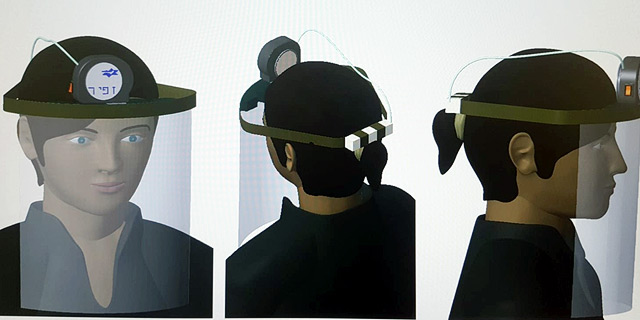
Breathalyzer to Diagnose Coronavirus is Latest Disease-Fighting Device to Emerge from Israeli Defense Tech Units
Military technology units at Israel’s Ministry of Defense continue to develop technologies aimed towards helping hospitals and hospital staff, from developing a breathalyzer to diagnose coronavirus, to creating a mask equipped with a steam blower for medical professionals, among other technologies
Udi Etsion and Adi Pick | 19:13, 17.05.20
From the outside, it may look like a vacuum cleaner with an iPad, but inside, the technology is developed by Israeli defense contractor Rafael Advanced Defense Systems Ltd. Last week, Sheba Medical Center began trialing robots that will, in two months’ time Rafael says, be able to replace some of the medical staff in coronavirus (Covid-19) units, for tasks such as distributing drugs to patients, Israel’s Channel 12 News reported on Friday.
While Israel’s security systems are beginning to return to their pre-coronavirus routines, many military technology units continue to develop technologies aimed towards helping hospitals and hospital staff in their battle against Covid-19, from developing a breathalyzer to diagnose coronavirus, to creating a mask equipped with a steam blower for medical professionals, among other technologies.
For example, Haifa-based startup NanoScent Ltd. has partnered with the Israeli Defense Ministry’s Directorate of Defense Research and Development (Mafat), to jointly develop scent recognition technology that can help detect people with coronavirus symptoms. The system can recognize, by scent, whether someone in a given room had coronavirus. The device is also able to recognize whether a room contained someone with the virus, even if the patient had already left the room.
Mafat is also working to develop a breathalyzer-style device that could diagnose coronavirus within 60 seconds, Channel 12 News reported on Friday. This technology uses terahertz frequencies, which used to be used in order to identify whether a hen's egg was male or female. Within four days, Mafat employees were able to alter this technology to identify if a person has contracted Covid-19 or not.
The Ministry of Defense's tank and APC directorate has developed a mask with an electric steam blower and an attached battery, designed to solve one of the problems that every eyewear component encounters: the fumes that accumulate on the lenses when wearing face masks, such as the ones donned to prevent the spread of Covid-19. For medical teams, who are required to wear protective equipment for long hours when they come in contact with coronavirus patients, the vapors are a significant difficulty and sometimes do not allow them to read information from medical monitors.
The system designed by the tank engineers and given the nickname "Zapir" is based on a transparent mask, the top of which has the electric blower. The blower receives power from a battery mounted on the back of the system on the user's headband, and holds the mask in place. The blower costs the ministry several tens of shekels each.
After the system was tested in coronavirus departments, several dozen units were transferred to hospitals throughout the country. It has not yet been decided where the electric masks will be manufactured and whether they will be sold to the general public as well.
"This is not our normal field of activity, but with the help of our 150 engineers and students, we also connected with the Tel Hashomer hospital to look for solutions to the issues caused by the epidemic," Colonel Oren, head of the tank and APC directorate said in a recent interview with Calcalist.
Another development that the unit is working on is making direct use of technology that is currently being developed for the next version of the carriage tank, "the 4-lightning mark." This is a network of cameras that is already set up at a Hospital in Netanya, and is able to take pictures of patients' monitors, analyze the data they present, and alert staff when the parameters of the patients exceed the permissible range, all without the staff having to physically get close to the patients. The system will also be installed at Wolfson Hospital in Holon.